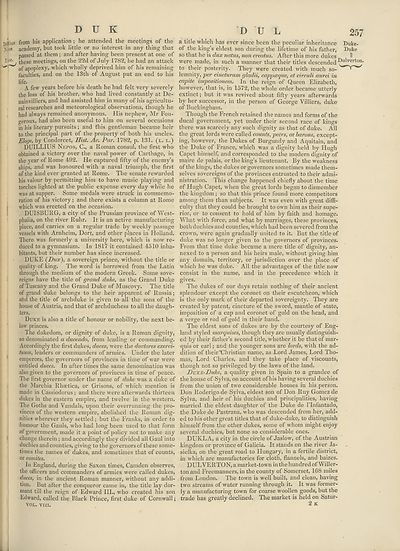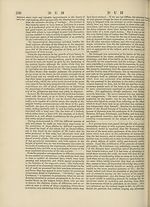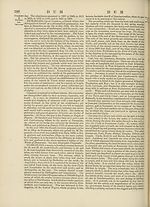Encyclopaedia Britannica > Volume 8, DIA-England
(267) Page 257
Download files
Complete book:
Individual page:
Thumbnail gallery: Grid view | List view

D U K
Julius from his application ; he attended the meetings of the
N os academy, but took little or no interest in any thing that
passed at them; and after having been present at one of
r ite- j.jjggg meetings, on the 22d of July 1782, he had an attack
of apoplexy, which wholly deprived him of his remaining
faculties, and on the 13th of August put an end to his
life.
A few years before his death he had felt very severely
the loss of his brother, who had lived constantly at De-
nainvilliers, and had assisted him in many of his agricultu¬
ral researches and meteorological observations, though he
had always remained anonymous. His nephew, Mr Fou-
geroux, had also been useful to him on several occasions
in his literary pursuits; and this gentleman became heir
to the principal part of the property of both his uncles.
Eloge, by Condorcet, Hist. Ac. Par. 1782, p. 131. (l. l.)
DUILLIUS Nepos, C., a Roman consul, the first who
obtained a victory over the naval power of Carthage, in
the year of Rome 492. He captured fifty of the enemy’s
ships, and was honoured with a naval triumph, the first
of the kind ever granted at Rome. The senate rewarded
his valour by permitting him to have music playing and
torches lighted at the public expense every day while he
was at supper. Some medals were struck in commemo¬
ration of his victory; and there exists a column at Rome
which was erected on the occasion.
DUISBURG, a city of the Prussian province of West¬
phalia, on the river Ruhr. It is an active manufacturing
place, and carries on a regular trade by weekly passage
vessels with Arnheim, Dort, and other places in Holland.
There was formerly a university here, which is now re¬
duced to a gymnasium. In 1817 it contained 4510 inha¬
bitants, but their number has since increased.
DUKE {Dux), a sovereign prince, without the title or
quality of king. The word is borrowred from the Latin
through the medium of the modern Greek. Some sove¬
reigns have the title of grand duke, as the Grand Duke
of Tuscany and the Grand Duke of Muscovy. The title
of grand duke belongs to the heir apparent of Russia;
and the title of archduke is given to all the sons of the
house of Austria, and that of archduchess to all the daugh¬
ters.
Duke is also a title of honour or nobility, the next be¬
low princes.
The dukedom, or dignity of duke, is a Roman dignity,
so denominated a ducendo, from leading or commanding.
Accordingly the first dukes, duces, were the ductores exerci-
tuum, leaders or commanders of armies. Under the later
emperors, the governors of provinces in time of war were
entitled duces. In after times the same denomination was
also given to the governors of provinces in time of peace.
The first governor under the name of duke was a duke of
the Marchia Rhactica, or Grisons, of which mention is
made in Cassiodorus ; and there were afterwards thirteen
dukes in the eastern empire, and twelve in the western.
The Goths and Vandals, upon their overrunning the pro¬
vinces of the western empire, abolished the Roman dig¬
nities wherever they settled; but the Franks, in order to
humour the Gauls, who had long been used to that form
of government, made it a point of policy not to make any
change therein ; and accordingly they divided all Gaul into
duchies and counties, giving to the governors of these some¬
times the names of dukes, and sometimes that of counts,
or comites.
In England, during the Saxon times, Camden observes,
the officers and commanders of armies were called dukes,
duces, in the ancient Roman manner, without any addi¬
tion. But after the conqueror came in, the title lay dor¬
mant till the reign of Edward III., who created his son
Edward, called the Black Prince, first duke of Cornwall;
VOL. VIII.
d i: L 257
a title which has ever since been the peculiar inheritance Duke-
of the king’s eldest son during the lifetime of his father, Duke
so that he is dux natus, non creatus. After this more dukes II
were made, in such a manner that their titles descended ^Iv^on.
to their posterity. They were created with much so-
lemnity, per cincturam gladii, cappceque, et circuli aurei in
capite impositionem. In the reign of Queen Elizabeth,
however, that is, in 1572, the whole order became utterly
extinct; but it was revived about fifty years afterwards
by her successor, in the person of George Villiers, duke
of Buckingham.
Though the French retained the names and forms of the
ducal government, yet under their second race of kings
there was scarcely any such dignity as that of duke. All
the great lords were called counts, peers, or barons, except¬
ing, however, the Dukes of Burgundy and Aquitain, and
the Duke of France, which was a dignity held by Hugh
Capet himself, and corresponded to the modern dignity of
maire de palais, or the king’s lieutenant. By the weakness
of the kings, the dukes or governors sometimes made them¬
selves sovereigns of the provinces entrusted to their admi¬
nistration. This change happened chiefly about the time
of Hugh Capet, when the great lords began to dismember
the kingdom; so that this prince found more competitors
among them than subjects. It was even with great diffi¬
culty that they could be brought to own him as their supe¬
rior, or to consent to hold of him by faith and homage.
What with force, and what by marriages, these provinces,
both duchies and counties, which had been severed from the
crown, were again gradually united to it. But the title of
duke was no longer given to the governors of provinces.
From that time duke became a mere title of dignity, an¬
nexed to a person and his heirs male, without giving him
any domain, territory, or jurisdiction over the place of
which he was duke. All the advantages of the title now
consist in the name, and in the precedence which it
gives.
The dukes of our days retain nothing of their ancient
splendour except the coronet on their escutcheon, which
is the only mark of their departed sovereignty. They are
created by patent, cincture of the sword, mantle of state,
imposition of a cap and coronet of gold on the head, and
a verge or rod of gold in their hand.
The eldest sons of dukes are by the courtesy of Eng¬
land styled marquises, though they are usually distinguish¬
ed by their father’s second title, whether it be that of mar¬
quis or earl; and the younger sons are lords, with the ad¬
dition of their "Christian name, as Lord James, Lord Tho¬
mas, Lord Charles, and they take place of viscounts,
though not so privileged by the laws of the land.
DuKE-Duke, a quality given in Spain to a grandee of
the house of Sylva, on account of his having several duchies
from the union of two considerable houses in his person.
Don Roderigo de Sylva, eldest son of Don Ruy Gomez de
Sylva, and heir of his duchies and principalities, having
married the eldest daughter of the Duke de ITnfantado,
the Duke de Pastrana, who was descended from her, add¬
ed to his other great titles that of duke-duke, to distinguish
himself from the other dukes, some of whom might enjoy
several duchies, but none so considerable ones.
DUKLA, a city in the circle of Jaslow, of the Austrian
kingdom or province of Galicia. It stands on the river Ja-
sielka, on the great road to Hungary, in a fertile district,
in which are manufactories for cloth, flannels, and baizes.
DULVERTON,amarket-town in the hundred of Willer-
ton and Freemanners, in the county of Somerset, 168 miles
from London. The town is well built, and clean, having
two streams of water running through it. It was former¬
ly a manufacturing town for coarse woollen goods, but the
trade has greatly declined. The market is held on Satur-
Julius from his application ; he attended the meetings of the
N os academy, but took little or no interest in any thing that
passed at them; and after having been present at one of
r ite- j.jjggg meetings, on the 22d of July 1782, he had an attack
of apoplexy, which wholly deprived him of his remaining
faculties, and on the 13th of August put an end to his
life.
A few years before his death he had felt very severely
the loss of his brother, who had lived constantly at De-
nainvilliers, and had assisted him in many of his agricultu¬
ral researches and meteorological observations, though he
had always remained anonymous. His nephew, Mr Fou-
geroux, had also been useful to him on several occasions
in his literary pursuits; and this gentleman became heir
to the principal part of the property of both his uncles.
Eloge, by Condorcet, Hist. Ac. Par. 1782, p. 131. (l. l.)
DUILLIUS Nepos, C., a Roman consul, the first who
obtained a victory over the naval power of Carthage, in
the year of Rome 492. He captured fifty of the enemy’s
ships, and was honoured with a naval triumph, the first
of the kind ever granted at Rome. The senate rewarded
his valour by permitting him to have music playing and
torches lighted at the public expense every day while he
was at supper. Some medals were struck in commemo¬
ration of his victory; and there exists a column at Rome
which was erected on the occasion.
DUISBURG, a city of the Prussian province of West¬
phalia, on the river Ruhr. It is an active manufacturing
place, and carries on a regular trade by weekly passage
vessels with Arnheim, Dort, and other places in Holland.
There was formerly a university here, which is now re¬
duced to a gymnasium. In 1817 it contained 4510 inha¬
bitants, but their number has since increased.
DUKE {Dux), a sovereign prince, without the title or
quality of king. The word is borrowred from the Latin
through the medium of the modern Greek. Some sove¬
reigns have the title of grand duke, as the Grand Duke
of Tuscany and the Grand Duke of Muscovy. The title
of grand duke belongs to the heir apparent of Russia;
and the title of archduke is given to all the sons of the
house of Austria, and that of archduchess to all the daugh¬
ters.
Duke is also a title of honour or nobility, the next be¬
low princes.
The dukedom, or dignity of duke, is a Roman dignity,
so denominated a ducendo, from leading or commanding.
Accordingly the first dukes, duces, were the ductores exerci-
tuum, leaders or commanders of armies. Under the later
emperors, the governors of provinces in time of war were
entitled duces. In after times the same denomination was
also given to the governors of provinces in time of peace.
The first governor under the name of duke was a duke of
the Marchia Rhactica, or Grisons, of which mention is
made in Cassiodorus ; and there were afterwards thirteen
dukes in the eastern empire, and twelve in the western.
The Goths and Vandals, upon their overrunning the pro¬
vinces of the western empire, abolished the Roman dig¬
nities wherever they settled; but the Franks, in order to
humour the Gauls, who had long been used to that form
of government, made it a point of policy not to make any
change therein ; and accordingly they divided all Gaul into
duchies and counties, giving to the governors of these some¬
times the names of dukes, and sometimes that of counts,
or comites.
In England, during the Saxon times, Camden observes,
the officers and commanders of armies were called dukes,
duces, in the ancient Roman manner, without any addi¬
tion. But after the conqueror came in, the title lay dor¬
mant till the reign of Edward III., who created his son
Edward, called the Black Prince, first duke of Cornwall;
VOL. VIII.
d i: L 257
a title which has ever since been the peculiar inheritance Duke-
of the king’s eldest son during the lifetime of his father, Duke
so that he is dux natus, non creatus. After this more dukes II
were made, in such a manner that their titles descended ^Iv^on.
to their posterity. They were created with much so-
lemnity, per cincturam gladii, cappceque, et circuli aurei in
capite impositionem. In the reign of Queen Elizabeth,
however, that is, in 1572, the whole order became utterly
extinct; but it was revived about fifty years afterwards
by her successor, in the person of George Villiers, duke
of Buckingham.
Though the French retained the names and forms of the
ducal government, yet under their second race of kings
there was scarcely any such dignity as that of duke. All
the great lords were called counts, peers, or barons, except¬
ing, however, the Dukes of Burgundy and Aquitain, and
the Duke of France, which was a dignity held by Hugh
Capet himself, and corresponded to the modern dignity of
maire de palais, or the king’s lieutenant. By the weakness
of the kings, the dukes or governors sometimes made them¬
selves sovereigns of the provinces entrusted to their admi¬
nistration. This change happened chiefly about the time
of Hugh Capet, when the great lords began to dismember
the kingdom; so that this prince found more competitors
among them than subjects. It was even with great diffi¬
culty that they could be brought to own him as their supe¬
rior, or to consent to hold of him by faith and homage.
What with force, and what by marriages, these provinces,
both duchies and counties, which had been severed from the
crown, were again gradually united to it. But the title of
duke was no longer given to the governors of provinces.
From that time duke became a mere title of dignity, an¬
nexed to a person and his heirs male, without giving him
any domain, territory, or jurisdiction over the place of
which he was duke. All the advantages of the title now
consist in the name, and in the precedence which it
gives.
The dukes of our days retain nothing of their ancient
splendour except the coronet on their escutcheon, which
is the only mark of their departed sovereignty. They are
created by patent, cincture of the sword, mantle of state,
imposition of a cap and coronet of gold on the head, and
a verge or rod of gold in their hand.
The eldest sons of dukes are by the courtesy of Eng¬
land styled marquises, though they are usually distinguish¬
ed by their father’s second title, whether it be that of mar¬
quis or earl; and the younger sons are lords, with the ad¬
dition of their "Christian name, as Lord James, Lord Tho¬
mas, Lord Charles, and they take place of viscounts,
though not so privileged by the laws of the land.
DuKE-Duke, a quality given in Spain to a grandee of
the house of Sylva, on account of his having several duchies
from the union of two considerable houses in his person.
Don Roderigo de Sylva, eldest son of Don Ruy Gomez de
Sylva, and heir of his duchies and principalities, having
married the eldest daughter of the Duke de ITnfantado,
the Duke de Pastrana, who was descended from her, add¬
ed to his other great titles that of duke-duke, to distinguish
himself from the other dukes, some of whom might enjoy
several duchies, but none so considerable ones.
DUKLA, a city in the circle of Jaslow, of the Austrian
kingdom or province of Galicia. It stands on the river Ja-
sielka, on the great road to Hungary, in a fertile district,
in which are manufactories for cloth, flannels, and baizes.
DULVERTON,amarket-town in the hundred of Willer-
ton and Freemanners, in the county of Somerset, 168 miles
from London. The town is well built, and clean, having
two streams of water running through it. It was former¬
ly a manufacturing town for coarse woollen goods, but the
trade has greatly declined. The market is held on Satur-
Set display mode to:
![]() Universal Viewer |
Universal Viewer | ![]() Mirador |
Large image | Transcription
Mirador |
Large image | Transcription
Images and transcriptions on this page, including medium image downloads, may be used under the Creative Commons Attribution 4.0 International Licence unless otherwise stated. ![]()
| Encyclopaedia Britannica > Encyclopaedia Britannica > Volume 8, DIA-England > (267) Page 257 |
|---|
| Permanent URL | https://digital.nls.uk/193326476 |
|---|
| Attribution and copyright: |
|
|---|
| Description | Ten editions of 'Encyclopaedia Britannica', issued from 1768-1903, in 231 volumes. Originally issued in 100 weekly parts (3 volumes) between 1768 and 1771 by publishers: Colin Macfarquhar and Andrew Bell (Edinburgh); editor: William Smellie: engraver: Andrew Bell. Expanded editions in the 19th century featured more volumes and contributions from leading experts in their fields. Managed and published in Edinburgh up to the 9th edition (25 volumes, from 1875-1889); the 10th edition (1902-1903) re-issued the 9th edition, with 11 supplementary volumes. |
|---|---|
| Additional NLS resources: |
|

